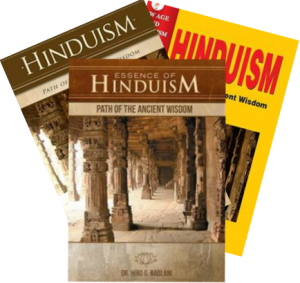Ved Vyasa is considered the compiler of the four Vedas. But as there were many restrictions on common people, women, and the low-caste Shudras, Ved Vyasa later wrote the Mahabharata and the Bhagavatam. In this way, the dominant influence of the high-caste Brahmins of the Aryan period was contained in these subsequent Hindu scriptures. The Srimad Bhagavatam was written for common man, who is not well versed in complex philosophies and academic deliberations. The teachings are therefore quite simple and straightforward:
- Only as much as is needed by the stomach, you may take and eat. If one takes more than that, it is sinful.
- One who sees eternal soul in all beings and sees all beings in the soul is the man of spirituality.
- For one who attains excellence in his trade or profession, it is not for any personal ego satisfaction or selfish gain; rather, it is for the service and well-being of all.
- One who uses his knowledge or strength for his own selfish ends may be destroyed, as Ravana was destroyed, even though he was a Brahmin of very high knowledge and a king with great power.
- According to the teachings of the Bhagavatam, the loftiest Vedantic thought is vasudhaiva kutumbakam—the whole world is but a family. In all beings there pervades the same cosmic spirit. There is none alien, so we need have no enmity toward anyone.
Only in the human form is one in a position to offer devotional prayers to God. Human birth is, therefore, considered as the most precious birth. By remembering God, one remembers the divine virtues of God. Man then gradually attains these virtues, such as truth, purity, compassion, forgiveness, renunciation, contentment, equanimity, austerity, peace, reading the scriptures, brilliance, courage, power, enthusiasm, pride, humility, and many more.
- The king (or the politician) in whose reign the people are unhappy and sorrowful loses his name, fame, life, and prosperity. It is the primary duty of the king (or the politician) to keep his people happy and satisfied.
- Beyond the formed God is the subtle, formless, transcendental soul, Paramatma, which is the root source of everything.
- Those who have overcome their ego and have surrendered everything at the feet of the Lord, they may not be disturbed by the happenings of the world.
- True saints are above arguments and controversies. They must clean the slate of their mind and look at things without uttering a word to anyone.
- Those who would dishonor others and then pray before the idol of God are not true worshippers. Those who harbor enmity toward anyone are also not the real seekers of the Lord. God is present in all beings.
- If anyone slanders others, it is an unholy practice. With such acts, we may lose the merit of spirituality.
- When man becomes old and is not able to earn money, his wife and children, for whom he worked hard all his life, often disrespect him. Yet he does not take the path of renunciation and spirituality.
- Man must always tell the truth. He should never be envious. He must be respectful to others, especially so to his parents and all elders.
- A spiritual man would feel shy and embarrassed to hear his praise, but the wicked often become swollen with arrogance after hearing their praise and flattery. We should therefore praise only God.
- Many are the sinful and wicked persons who wear the robes of saints but who are cheats and hypocrites.
- Prayer ceremony (havan, yagna, etc.) must not be done with any selfish motive or for any ulterior motive to harm others.
- It is the sacred task of the soul to gradually transform the mind over many birth cycles. By engaging the mind in contemplation, meditation, and getting deeply engrossed in the thought of the Lord, finally this transformation takes place.
- Man often gets trapped in the infatuation of women, children, and even animal pets that he forgets all other duties and also turns his attention away from God.
- During the fast, we must always give charity to the poor. Whenever we keep a fast, it is for the sake of self-purification. On fast days, we must not become angry, we must not be greedy, and we must not slander and hurt others.
- We must do charity but with some control. We must divide our wealth in five parts. One part is for charity. The second is for our name. The third is for increasing our wealth and prosperity. The fourth is for our own comfort and security. The fifth is for helping our near and dear ones. Thus, we must be discreet and organized in matters of our wealth and material assets. Many persons give so much charity that nothing is left for their own survival or for their family and close relatives.
It is said that there is no joy greater than the joy of giving. Coveting merely brings us fleeting pleasure. The senses are dependent upon an external supply of commodities. When the supply is stopped, the senses cannot send the feelings of pleasure anymore. Sensuality is thus a matter of dependence. The worst example of this sensual affection is drug addiction. A person may often do harm to himself and to others for procuring the substance, which gives but a fleeting pleasure. Helping others brings us the joy of fulfillment. When we are asked for help, we often retract and dry up. We are so conditioned to receive the pleasurable feelings through acts of taking and receiving that we do not realize that giving and helping can be a source of much greater and more lasting joy. We therefore should redefine our mental attitudes and welcome the calls for help as opportunities for our self-fulfillment and lasting joy.
- Forgiveness is a divine virtue. By forgiveness, we may attain God.
- Greed and lust may never be fully satisfied. However much we may get and enjoy, we remain unfulfilled and unsatisfied. Our true joy is in God and in performing the spiritual or divine actions.
- When Lord Krishna plays the sweet and melodious tunes on his flute, all become intoxicated. May they be the birds of the forest, cows, shepherds, or village maids (gopis). They forget everything and listen to his divine music. Such is the magic of God. Once the Divine entraps the man, he does not like to be separated. This is the eternal peace; this is the permanent bliss; and this is the everlasting joy. Whatever the entire world may say, the man of divinity forsakes all other relationships and cares not for shame or honor; he simply wants to drink in the nectar of divinity.
- Man may ever be like a forest tree. It suffers the extreme degrees of the heat of the sun but gives cool shade to others; it gives leaves, fruits, flowers, wood, coal, and so much more. Only those who serve others and lay down their lives for the benefit of others know the true value of life. Only their lives are worthy lives.
- Spend your life in the world, but keep your mind and soul in the meditation of the Lord. When the day is over, rejoice that you will return to God. Make God your constant companion.
- All beings have the seed of God within. Even wicked persons have this divine seed within them. This seed may germinate and grow with one’s own effort and by the grace of the Lord. It’s man’s duty to remain in tune with the Lord all the time.
- Like the honeybee gathers trickles of honey from different flowers, so, too, the men of wisdom assimilate the essence of all scriptures and choose only the good in all religions.
The Srimad Bhagavatam has become the immortal scripture of Hindus. Said the famous Srimad Bhagavatam guru Sri Mridul Shastri:
“You must always go before God with humility and simplicity. Only then will you attain the divine grace and blessings. If you will attend the full narration (katha) of the Bhagavatam for all seven days with faith and sincerity, you will have enough spiritual vibrations to get all the answers to your queries from within.”
The main purpose of a religion is to impart spiritual and moral teachings. Srimad Bhagavatam has simply excelled in this great mission. The teachings are presented in a very simple and earthly manner. The earlier scriptures of Vedas and Upanishads were inaccessible to women and persons belonging to lower castes; the subsequent scriptures, especially the Srimad Bhagavatam corrected this anomaly right away. Its teachings often dwell on most ordinary, daily activities like eating habits, personal behavior, and relationship with other beings etc., guiding individuals to improve the quality of their lives and adding value to the tasks they undertake, regardless of big or small. Even though Srimad Bhagavatam is most theistic and underlines God incarnation, it also recognises the basic Hindu concept of the transcendental, formless Divine behind all these manifestations, thus maintaining a sense of harmony between different philosophical ideas and opinions.
Srimad Bhagavatam also introduced the concept of “grace”. When one surrenders completely and sincerely at the lotus feet of the Lord, one may obtain the grace of God. With His grace, all previous harmful effects of the bad karmas may be mitigated. This is in contrast with the Jainism and Buddhism philosophy, where there is no room for such mercy and benevolence. All karmas must be fully accounted for. With the phenomenon of grace, Hindu philosophy moved toward mental reform and transformation as the goal, replacing proper justice and punishment.
We also often forget our vows and pledges, repeatedly committing iniquities and sins; Srimad Bhagavatam warns of such wrongful behavior. Even the most powerful persons have succumbed under the spell of lust. One may therefore avoid becoming intimate with anyone but their lawful spouse. The institute of marriage has been vindicated fully. According to the teachings of the Bhagavatam, the loftiest Vedantic thought is vasudhaiva kutumbakam—the whole world is but a family. In all beings there pervades the same cosmic spirit. There is none alien, so we need have no enmity toward anyone. Repeating the name of God, remembering Him at alltimes, avoiding any sinful activity, and performing sincerely one’s allotted duties-these are the main teachings of Srimad Bhagavatam.
NOTE: All quotes are adapted from: Lokram P. Dodeja. Srimad
Bhagavad (Sindhi Language). Pune, India, 1950.




